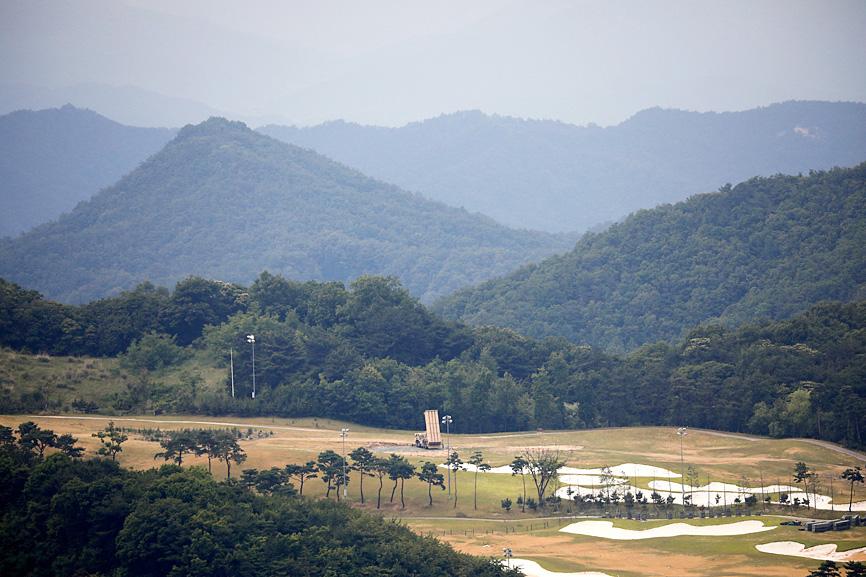China and South Korea yesterday clashed over a US missile defense shield, threatening to undermine efforts by the new government in Seoul to overcome long-standing security differences.
The disagreement over the Terminal High Altitude Area Defense (THAAD) system installed in South Korea emerged after an apparently smooth first visit to China by South Korea’s foreign minister this week.
China, contending that the THAAD’s powerful radar could peer into its airspace, curbed trade and cultural imports after Seoul announced its deployment in 2016, dealing a major blow to relations.

Photo: Reuters
A senior official in South Korea’s presidential office yesterday told reporters that the THAAD is a means of self-defense and can never be subject to negotiations, after China demanded that Seoul not deploy any more batteries and limit the use of existing ones.
South Korean President Yoon Suk-yeol, seeing the system as key to countering North Korean missiles, has vowed to abandon the previous government’s promises not to increase THAAD deployments, and not to participate in a US-led global missile shield or create a trilateral military alliance involving Japan.
On the campaign trail, the conservative Yoon pledged to buy another THAAD battery, but since taking office in May, his government has focused on what officials call “normalizing” the operation of the existing, US-owned and operated system.
South Korean Minister of Foreign Affairs Park Jin and his Chinese counterpart, Wang Yi (王毅) at a meeting on Tuesday explored ways to reopen denuclearization talks with Pyongyang and resume cultural exports, such as K-pop music and movies, to China.
A Wang spokesman said on Wednesday the two had “agreed to take each other’s legitimate concerns seriously and continue to prudently handle and properly manage this issue to make sure it does not become a stumbling block to the sound and steady growth of bilateral relations.”
The Chinese spokesman told a briefing the THAAD deployment in South Korea “undermines China’s strategic security interest.”
However, Park told Wang that Seoul would not abide by the 2017 agreement — called the “three noes” — as it is not a formal pledge or agreement, the South Korean foreign ministry said in a statement.
China also said Seoul should abide by “one restriction” — limiting the use of existing THAAD batteries.
South Korea has never acknowledged that element, but on Wednesday, Wang’s spokesman said that China attaches importance to the position of “three noes and one restriction.”
South Korean Minister of National Defense Lee Jong-sup said the policy on the THAAD would not change because of China’s opposition, and the system’s radar could not be used against China.
“The current battery is not structured to play any role in US defenses, but placed in a location where it can only defend the Korean Peninsula,” he told reporters.

Right-wing political scientist Laura Fernandez on Sunday won Costa Rica’s presidential election by a landslide, after promising to crack down on rising violence linked to the cocaine trade. Fernandez’s nearest rival, economist Alvaro Ramos, conceded defeat as results showed the ruling party far exceeding the threshold of 40 percent needed to avoid a runoff. With 94 percent of polling stations counted, the political heir of outgoing Costa Rican President Rodrigo Chaves had captured 48.3 percent of the vote compared with Ramos’ 33.4 percent, the Supreme Electoral Tribunal said. As soon as the first results were announced, members of Fernandez’s Sovereign People’s Party

EMERGING FIELDS: The Chinese president said that the two countries would explore cooperation in green technology, the digital economy and artificial intelligence Chinese President Xi Jinping (習近平) yesterday called for an “equal and orderly multipolar world” in the face of “unilateral bullying,” in an apparent jab at the US. Xi was speaking during talks in Beijing with Uruguayan President Yamandu Orsi, the first South American leader to visit China since US special forces captured then-Venezuelan president Nicolas Maduro last month — an operation that Beijing condemned as a violation of sovereignty. Orsi follows a slew of leaders to have visited China seeking to boost ties with the world’s second-largest economy to hedge against US President Donald Trump’s increasingly unpredictable administration. “The international situation is fraught

MORE RESPONSIBILITY: Draftees would be expected to fight alongside professional soldiers, likely requiring the transformation of some training brigades into combat units The armed forces are to start incorporating new conscripts into combined arms brigades this year to enhance combat readiness, the Executive Yuan’s latest policy report said. The new policy would affect Taiwanese men entering the military for their compulsory service, which was extended to one year under reforms by then-president Tsai Ing-wen (蔡英文) in 2022. The conscripts would be trained to operate machine guns, uncrewed aerial vehicles, anti-tank guided missile launchers and Stinger air defense systems, the report said, adding that the basic training would be lengthened to eight weeks. After basic training, conscripts would be sorted into infantry battalions that would take

GROWING AMBITIONS: The scale and tempo of the operations show that the Strait has become the core theater for China to expand its security interests, the report said Chinese military aircraft incursions around Taiwan have surged nearly 15-fold over the past five years, according to a report released yesterday by the Democratic Progressive Party’s (DPP) Department of China Affairs. Sorties in the Taiwan Strait were previously irregular, totaling 380 in 2020, but have since evolved into routine operations, the report showed. “This demonstrates that the Taiwan Strait has become both the starting point and testing ground for Beijing’s expansionist ambitions,” it said. Driven by military expansionism, China is systematically pursuing actions aimed at altering the regional “status quo,” the department said, adding that Taiwan represents the most critical link in China’s